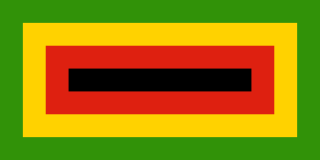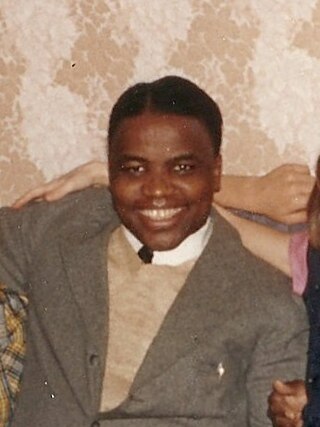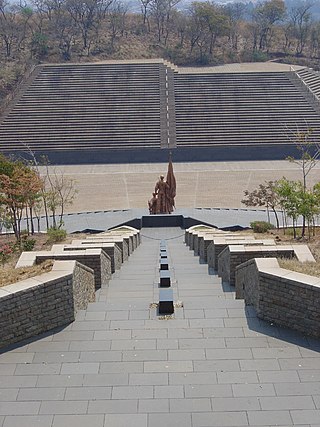
The Zimbabwe African National Union – Patriotic Front (ZANU–PF) is a political organisation which has been the ruling party of Zimbabwe since independence in 1980. The party was led for many years by Robert Mugabe, first as prime minister with the Zimbabwe African National Union (ZANU) and then as president from 1987 after the merger with the Zimbabwe African People's Union (ZAPU) and retaining the name ZANU–PF, until 2017, when he was removed as leader.

Joshua Mqabuko Nyongolo Nkomo was a Zimbabwean revolutionary and politician who served as Vice-President of Zimbabwe from 1990 until his death in 1999. He founded and led the Zimbabwe African People's Union (ZAPU) from 1961 until it merged in 1987 with Robert Mugabe's Zimbabwe African National Union (ZANU) to form ZANU–PF after an internal military crackdown called Gukurahundi in western Zimbabwe, mostly on ethnic Ndebele ZAPU supporters.

Ndabaningi Sithole was the founder of the Zimbabwe African National Union (ZANU), a militant, nationalist organisation that opposed the government of Rhodesia, in July 1963. Sithole's father was Ndau and his mother was Ndebele. He worked as a United Church of Christ in Zimbabwe (UCCZ) minister. He spent 10 years in prison after the government banned ZANU. A rift along tribal lines split ZANU in 1975, and he lost the 1980 elections to Robert Mugabe.

The Rhodesian Bush War, also called the Second Chimurenga as well as the Zimbabwean War of Liberation, was a civil conflict from July 1964 to December 1979 in the unrecognised country of Rhodesia.

Zimbabwe African National Liberation Army (ZANLA) was the military wing of the Zimbabwe African National Union (ZANU), a militant African nationalist organisation that participated in the Rhodesian Bush War against white minority rule of Rhodesia.
The Front for the Liberation of Zimbabwe (FROLIZI) was an African nationalist organisation established in opposition to the white minority government of Rhodesia. It was announced in Lusaka, Zambia in October 1971 as a merger of the two principal African nationalist factions in Rhodesia, the Zimbabwe African People's Union (ZAPU) and the Zimbabwe African National Union (ZANU). However, it was in fact a breakaway faction of both ZAPU and ZANU, established by members of both groups who had become disaffected due to their rival organisations' incessant internal and external disputes. Its domination by members of the Zezuru, a subgroup of the Shona people, led to accusations that it was merely a tribal grouping and ridicule as the "Front for the Liaison of Zezuru Intellectuals".
Josiah Mushore Chinamano fought in the Second Liberation War as a guerrilla of the Zimbabwe African People's Union. He later served as the Minister of Transport.
James Robert Dambaza Chikerema served as the President of the Front for the Liberation of Zimbabwe. He changed his views on militant struggle in the late 1970s and supported the 'internal settlement', serving in the attempted power-sharing governments.

Joseph Wilfred Msika, was a Zimbabwean politician who served as Second Vice-President of Zimbabwe from 1999 to 2009.
The Southern Rhodesia African National Congress (SRANC) was a political party active between 1957–1959 in Southern Rhodesia. Committed to the promotion of indigenous African welfare, it was the first fully fledged black nationalist organisation in the country. While short-lived — it was outlawed by the predominantly white minority government in 1959 — it marked the beginning of political action towards black majority rule in Southern Rhodesia, and was the original incarnation of the National Democratic Party (NDP); the Zimbabwe African People's Union (ZAPU); the Zimbabwe African National Union (ZANU); and the Zimbabwe African National Union — Patriotic Front (ZANU–PF), which has governed Zimbabwe continuously since 1980. Many political figures who later became prominent, including Robert Mugabe and Joshua Nkomo, were members of the SRANC.

National Heroes Acre or simply Heroes Acre is a burial ground and national monument in Harare, Zimbabwe. The 23-hectare (57-acre) site is situated on a ridge seven kilometres from Harare, towards Norton. Its stated purpose is to commemorate Patriotic Front guerrillas killed during the Rhodesian Bush War, and contemporary Zimbabweans whose dedication or commitment to their country justify their interment at the shrine. Persons buried here are considered heroes by the incumbent Zimbabwe African National Union – Patriotic Front regime, which has administered the country since independence at 1980. Indeed, most of the recipients of the 'hero status' were known to be Zanu-PF sympathisers.

Air Rhodesia Flight 825 was a scheduled passenger flight that was shot down by the Zimbabwe People's Revolutionary Army (ZIPRA) on 3 September 1978, during the Rhodesian Bush War. The aircraft involved, a Vickers Viscount named the Hunyani, was flying the last leg of Air Rhodesia's regular scheduled service from Victoria Falls to the capital Salisbury, via the resort town of Kariba.

Robert Gabriel Mugabe was a Zimbabwean revolutionary and politician who served as Prime Minister of Zimbabwe from 1980 to 1987 and then as President from 1987 to 2017. He served as Leader of the Zimbabwe African National Union (ZANU) from 1975 to 1980 and led its successor political party, the ZANU – Patriotic Front (ZANU–PF), from 1980 to 2017. Ideologically an African nationalist, during the 1970s and 1980s he identified as a Marxist–Leninist, and as a socialist after the 1990s.
Ruth Lottie Nomonde Chinamano was a ZANU-PF politician and wife of Josiah Mushore Chinamano.
Tichafa Samuel Parirenyatwa was Zimbabwe's first trained black physician, medical doctor and the first vice-president of the Zimbabwe African People's Union (ZAPU). He rose to prominence during ZAPU's political struggle against the colonial administration in Southern Rhodesia.

The Geneva Conference took place in Geneva, Switzerland during the Rhodesian Bush War. Held under British mediation, its participants were the unrecognised government of Rhodesia, led by Ian Smith, and a number of rival Rhodesian black nationalist parties: the African National Council, led by Bishop Abel Muzorewa; the Front for the Liberation of Zimbabwe, led by James Chikerema; and a joint "Patriotic Front" made up of Robert Mugabe's Zimbabwe African National Union and the Zimbabwe African People's Union led by Joshua Nkomo. The purpose of the conference was to attempt to agree on a new constitution for Rhodesia and in doing so find a way to end the Bush War raging between the government and the guerrillas commanded by Mugabe and Nkomo respectively.

The Victoria Falls Conference took place on 26 August 1975 aboard a South African Railways train halfway across the Victoria Falls Bridge on the border between the unrecognised state of Rhodesia and Zambia. It was the culmination of the "détente" policy introduced and championed by B. J. Vorster, the Prime Minister of South Africa, which was then under apartheid and was attempting to improve its relations with the Frontline States to Rhodesia's north, west and east by helping to produce a settlement in Rhodesia. The participants in the conference were a delegation led by the Rhodesian Prime Minister Ian Smith on behalf of his government, and a nationalist delegation attending under the banner of Abel Muzorewa's African National Council (UANC), which for this conference also incorporated delegates from the Zimbabwe African National Union (ZANU), the Zimbabwe African People's Union (ZAPU) and the Front for the Liberation of Zimbabwe (FROLIZI). Vorster and the Zambian President Kenneth Kaunda acted as mediators in the conference, which was held on the border in an attempt to provide a venue both sides would accept as neutral.
Joel Business Centre is the location of district administrative offices, parliamentary advisory offices, the post office and police station in the town of Zhombe, Zimbabwe. It is 64 km northwest of Kwekwe and 77 km southeast of Gokwe Centre. This small rural town center is the hub of both Zhombe Communal Land and Zhombe Central Ward.
Lazarus Nkala, known in political circles by the nickname UMavava, was a Rhodesian trade union leader, activist, and revolutionary. Born in Filabusi in Matabeleland, he attended mission and government schools and trained as a builder. He worked in Bulawayo, and became a union leader and African nationalist activist. In the 1950s and 60s, he served in leadership roles in the Southern Rhodesia African National Congress, National Democratic Party, and Zimbabwe African People's Union. He was detained in 1964 and, with the exception of a three-week period the following year, was held in continuous detention for the next ten years. Upon his release in 1974, he was named Organising Secretary of the ANC, and attended the Victoria Falls Conference as part of Joshua Nkomo's delegation. He died shortly after in an automobile accident driving from Salisbury to Bulawayo.

Callistus Dingiswayo Ndlovu was a Zimbabwean academic, diplomat, and politician. He joined the Zimbabwe African People's Union (ZAPU) in 1963 as a teacher in Matabeleland, and went on to serve as its representative to the United Nations and North America in the 1970s. After Zimbabwe's independence in 1980, he was a member of the House of Assembly from 1980 to 1985 and served as a senator from 1985 to 1990. He left ZAPU and joined the ruling ZANU–PF party in 1984.










